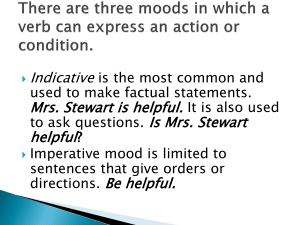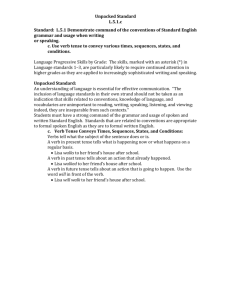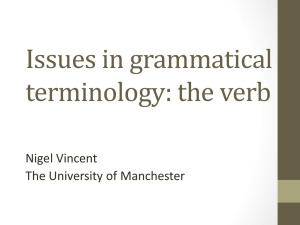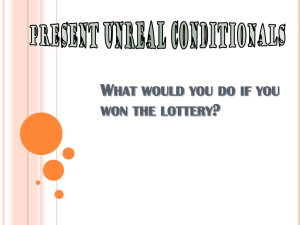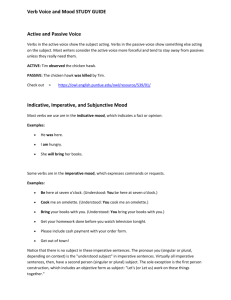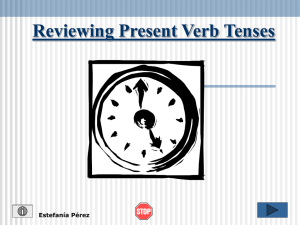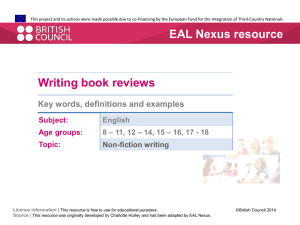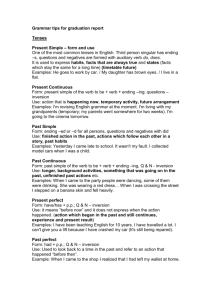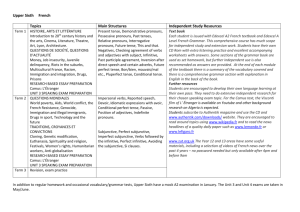Tenses
advertisement
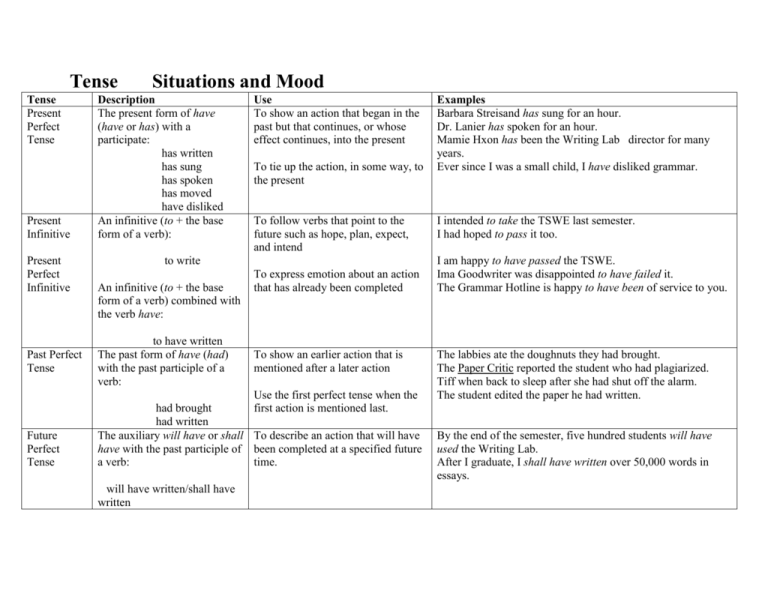
Tense Tense Present Perfect Tense Present Infinitive Present Perfect Infinitive Past Perfect Tense Situations and Mood Description The present form of have (have or has) with a participate: has written has sung has spoken has moved have disliked An infinitive (to + the base form of a verb): Use To show an action that began in the past but that continues, or whose effect continues, into the present To tie up the action, in some way, to the present To follow verbs that point to the future such as hope, plan, expect, and intend to write An infinitive (to + the base form of a verb) combined with the verb have: to have written The past form of have (had) with the past participle of a verb: To express emotion about an action that has already been completed To show an earlier action that is mentioned after a later action Use the first perfect tense when the first action is mentioned last. Future Perfect Tense had brought had written The auxiliary will have or shall To describe an action that will have have with the past participle of been completed at a specified future a verb: time. will have written/shall have written Examples Barbara Streisand has sung for an hour. Dr. Lanier has spoken for an hour. Mamie Hxon has been the Writing Lab director for many years. Ever since I was a small child, I have disliked grammar. I intended to take the TSWE last semester. I had hoped to pass it too. I am happy to have passed the TSWE. Ima Goodwriter was disappointed to have failed it. The Grammar Hotline is happy to have been of service to you. The labbies ate the doughnuts they had brought. The Paper Critic reported the student who had plagiarized. Tiff when back to sleep after she had shut off the alarm. The student edited the paper he had written. By the end of the semester, five hundred students will have used the Writing Lab. After I graduate, I shall have written over 50,000 words in essays. Present Tense The base and –s form of a verb: Past Tense writes (base form is write) The past form of a verb Past Perfect for Condition Conditional An if-clause + a past perfect verb Subjunctive Most common: would have I wish that I were… If I were… To show universally true statements, not limited to a particular time Hamlet is one of the most indecisive characters in literature. The labbie reminded us that “all right” is two words. To show an action that has already taken place To state a condition under which something could have or would have happened Use in only one part of the sentence—the part that shows what would have happened if an earlier action (past present) had occurred. Be sure not to use the words “would have” in the “if” clause. Ralph Ellison wrote Invisible Man, which is a story about a man’s struggle to find his identity in society. If I had seen the light, I would have stopped. It is very likely that they would have struck oil if only they had drilled twenty feet more. INCORRECT: If it would have rained another ten minutes, the game would have been called off. CORRECT: If it had rained another ten minutes, the game would have been called off. OTHER EXAMPLES: Frank would not have bought the car if he had known the reputation of the dealer. You too would have bought the dress if you had seen it. WISH STATEMENTS: I wish that I were going with you to Europe this summer. If I were President, I would lower taxes. A DOUBT OR UNCERTAINTY: If the weather report be true, we will have to change our plans. STATEMENT CONTRARY TO FACT: If she were appointed chair, we would have strong leadership. PARLIAMENTARY MOTION: I move that the proposal be adopted. CERTAIN SET PHRASES: Heaven forbid! If I were you… Far be it from me… Winner need not be present to win. TO EXPRESS NECESSITY, URGENCY, IMPORTANCE, OR INSISTENCE IN THAT –CLAUSES: It is important that all reports be submitted on time. The most common examples of subjunctive mood are wish statements. Subjunctive mood can also be used to express a doubt or uncertainty, statement contrary to fact, a parliamentary motion, and certain set phrases. Subjunctive mood is also used to express necessity, urgency, importance or insistence in that clauses after verbs of insisting, asking, ordering, requesting, and expressions as it is necessary and it was urged.
